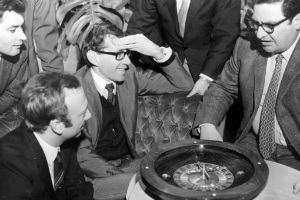
Medical researcher Richard Jarecki who cracked roulette in the 1970s, winning millions of dollars in European casinos, died on July 25 at the age of 86. Taking advantage of flawed roulette wheels, he became legendary among gamblers and a threat to some of the most popular casino facilities in Monte Carlo, Italy, and Las Vegas.
The news of Jarecki’s passing was reported on Thursday and multiple stories of his successful runs across gaming facilities in the 1960s and 1970s began to resurface. According to the New York Times, the German-born university professor died on July 25 in his home in Manila from pneumonia. Richard Jarecki was born in Germany but he grew up in the United States where his family was forced to emigrate by the Nazi party in the 1930s. He studied at Duke University and then, at the University of Heidelberg in Germany. According to reports from the 1960s, this is where he started winning huge amounts of money on roulette.
During the early 1960s, Dr. Jarecki and his wife visited dozens of casinos across Europe and in the United States. He was well-known in Monte Carlo, as well as in the casinos in Divonne-les-Bains, France, Las Vegas and Baden-Baden, Germany. He was also a regular player at the Italian Riviera casino in San Remo, which generated serious losses during his playing sessions. His success on the roulette table encouraged other gamblers to place the same bets and as a result, casinos generated even larger losses.
It is believed that Jarecki was banned from several casinos and according to his wife’s account, Italian authorities managed to bar him from entering the country for several months. The Morning Herald cites San Remo casino’s managing director Robert Lardera who said that by 1969, Jarecki was considered “a menace to every casino in Europe”. His casino winnings were believed to exceed $1.2 million or more than $8 million in today’s money, which is an exceptional amount of money since roulette is a random game. Winning and losing should be a matter of pure chance.
How Did He Crack the Roulette?

It turns out that Jarecki was actually carefully observing roulette wheels for slight imperfections and collected large amounts of data on each roulette table before he started playing. After analyzing the entire information gathered by himself and his friends, he successfully exploited these flaws in the construction of the wheels and the tables, eventually turning the edge in his favor. These imperfections included manufacturing defects, scratches, wear and tear, unleveled gaming tables, and more.
While he successfully used this method to win at roulette, he did not invent it. In reality, this strategy was created much earlier, in the 19th century by English engineer Joseph Jagger. Known as “the man who broke the bank in Monte Carlo”, Jagger is the first person known to have used this system. Others have also exploited the mechanical flaws of roulette wheels, however. It was exactly what Richard Jarecki took advantage of – any mechanical flaws and wear and tear that result in a bias toward certain numbers. After observing the ball for a long time, he could predict with a high degree of certainty where the ball would fall next.



























